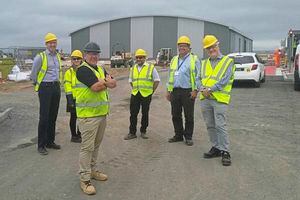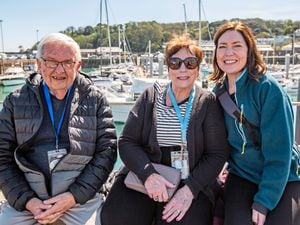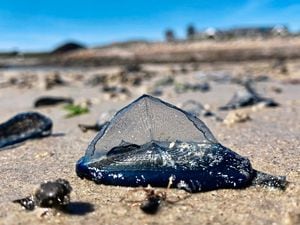Waste-to-Sweden contract is signed
A CONTRACT has been signed with one of Europe’s leading waste exporters, which will see material from Guernsey sent to a heat and energy recovery facility in Sweden.

Geminor UK has contracts with more than 70 treatment facilities in Europe, and will start exporting the island’s waste from October.
The company will manage between 20,000 and 25,000 tonnes of processed waste a year.
The initial deal is for three years, with the option to extend it until 2023.
The contract includes all transport arrangements from the new waste transfer station at Longue Hougue through to its final destination.
It will be shipped via the UK, using Geminor’s existing logistics network.
States Trading Assets deputy managing director Richard Evans said the length of the contract was chosen to maximise future opportunities.
‘We had an option to enter into a longer term agreement on the same terms. However, we have decided on an initial three years, with the option to extend this to 2023, because that gives us an opportunity to go back out to the market in the next few years.
‘Geminor is one of Europe’s leading RDF exporters, and already deals with nearly half a million tonnes a year from the UK and Ireland.
‘They have the expertise we require, and we will be benefitting from their established transport and logistics network.
‘They also have contracts with dozens of processing facilities, which provides excellent resilience for the island.’
The company has identified a high-efficiency energy recovery facility at Jonkoping, Sweden, where it intends to export material to, along with waste from the UK and Ireland.
Any materials left after processing, commonly known as fly ash and bottom ash, will be dealt with by the operator of the treatment facility.
Geminor was selected following a competitive tender process, which also attracted a bid from Jersey.
The company’s proposal was the cheapest and, despite the longer travel distance, also scored highest on the environmental assessment. That is because the Jonkoping plant is larger than the one in Jersey and more energy efficient.
Both produce electricity, but the Swedish facility captures heat from the process as well, and uses it to provide district heating. It is distributed to homes and businesses in the vicinity through a dedicated network of insulated underground pipes.
Guernsey will still benefit from the energy recovered, even though the electricity and heat will all be used in Sweden.
That is because the plant operator receives income from these that offsets its processing costs. Therefore the price to deal with Guernsey’s waste is lower than it would be if no energy was recovered, or a smaller, less efficient facility was used.
The Geminor contract does not include segregated food waste, which from next month will be collected separately from households.
That will instead undergo some processing on island, and then be shipped in tankers to the UK for treatment under an entirely separate export agreement.
This will also recover energy, but using a process known as anaerobic digestion.
That does not involve incineration, and is more efficient for this material.
Geminor UK
Geminor UK is part of Geminor Group, which has headquarters in Norway and operations in Sweden, Denmark, Germany and Finland. In 2017, it exported around ½ million tonnes of processed waste - known as refuse derived fuel (RDF) - from the UK and Ireland.
Sweden has a long term requirement for waste to fuel its power and heat generation network. According to the Swedish Waste Management Association, more than 1.4 million tonnes were imported in 2014, primarily from Norway, the UK and Ireland. Geminor forecasts annual demand increasing to two million tonnes a year by 2020.
The company’s multiple contracts with other European operators also provide several back-up options, should the Jonkoping plant be unavailable due to routine or unscheduled shutdown.
BOX: Waste background (information supplied by States Trading Assets):
Export benefits
Producing RDF for export will replace the island’s long reliance on landfill to dispose of thousands of tonnes of waste local households and businesses produce every year.
Landfill is being phased out throughout Western Europe, due to its environmental impacts. Waste from the current site at Mont Cuet and others used over the past 50 years are the second largest source of local greenhouse gas emissions. In 2016, only emissions from transport and motor vehicles generated more, with electricity production third.
Landfill also poses significant risks of ground pollution.
By exporting waste, the island avoids the high cost of developing a large heat treatment facility to deal with the material locally. The last plant that was proposed, in 2009, was expected to cost around £93 million to build.
Export also provides a more flexible option. An on-island treatment plant would require sufficient capacity to deal with the current volume of material, but its efficiency would reduce as the amount of waste being generated locally continues to fall.
Since 2010, the amount of waste landfilled has fallen from more than 35,000 tonnes to less than 30,000. This includes around 4,000 tonnes of ‘special waste’, such as asbestos and road sweepings, which is unsuitable for export and will continue to be disposed of at Mont Cuet.
One of the island’s largest commercial waste contractors already produces thousands of tonnes of RDF annually, and exports the material to Europe via the UK for energy recovery.
Regular shipments
However material will now be handled via Geminor’s main UK depot. Export will therefore involve daily shipments, via the existing freight link to Portsmouth, and make use of spare capacity on services returning to the UK after delivering goods to the island.
On average three to four trailers a day will be exported, using local haulier Profreight. There will be no bulk movements of containers from Longue Hougue, and no storage of material at the harbour.
Shipping to Sweden will also take advantage of otherwise unused capacity on existing freight routes. Geminor has a contract with one of Sweden’s largest paper producers, which has dedicated vessels delivering products to the UK every week. RDF from Guernsey will be sent in the opposite direction, after the ships have delivered their original cargo.
Waste Transfer Station
The new Longue Hougue transfer station will receive general household ‘black bag’ waste from parish collections, as well as commercial waste.
This will initially go through a mechanical shredding process, before undergoing magnetic separation to remove metals for recycling. The remaining material will then be formed into cube-shaped bales, approximately one metre high, and wrapped in plastic film. The processed waste is then termed as a ‘refuse derived fuel’.
The initial processing of food waste will also take place in the transfer station, before being loaded into tankers ready for export.





